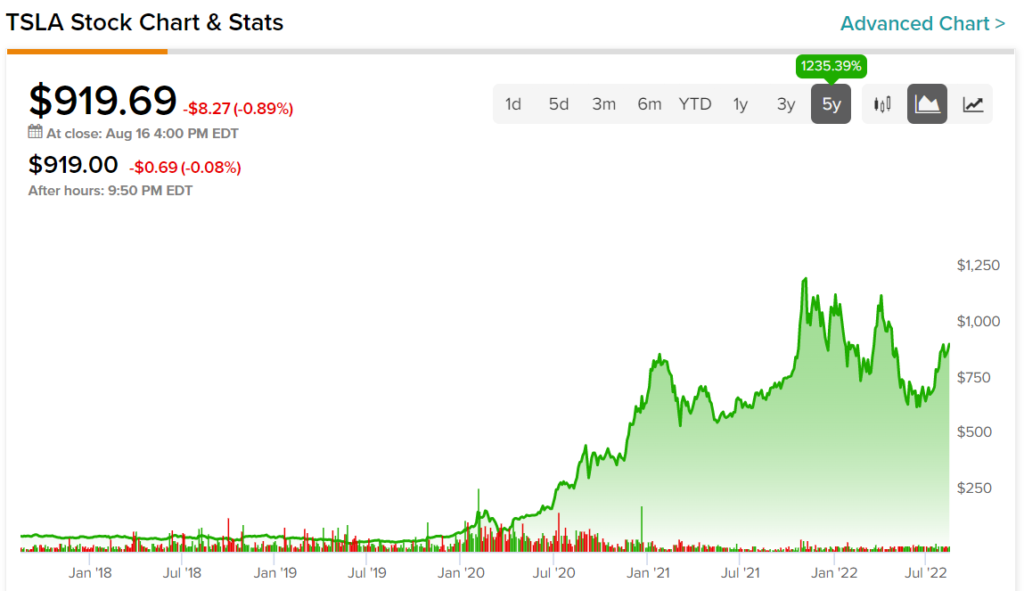EV giant Tesla (TSLA) seems to be in a major spot of bother. It’s dealing with the effects of growth at all costs and now faces massive competition. Moreover, its costs are growing rapidly while its valuation is completely divorced from its fundamentals. It could potentially lose out on its position in California, the largest U.S. market, amidst claims of deceptive marketing. Therefore, we are bearish on TSLA stock at this time.
Invest with Confidence:
- Follow TipRanks' Top Wall Street Analysts to uncover their success rate and average return.
- Join thousands of data-driven investors – Build your Smart Portfolio for personalized insights.
Tesla is an EV pioneer that has been in a hyper-growth mode for the past several years. It has enjoyed its first-movers advantage in the sphere, while sales growth has averaged close to 52% for the past five years. Moreover, forward estimates for some of the top profitability metrics are encouraging, which is a testament to the quality of its product.
However, amidst a myriad of challenges, it’s tough to assume that Tesla could continue its incredible form going forward. Despite the markets being in a downturn, its stock has moved in the opposite direction. While most stocks are trading at multi-year lows, TSLA stock trades well over its 5-year averages. Unlike my fellow colleague Steve Anderson, I don’t feel Tesla stock deserves a second look at this time.

Tesla Stock Faces a Myriad of Challenges
Many earlier investors in Tesla have gotten accustomed to the monster growth results posted by the business. However, as mentioned earlier, Tesla’s operating performance is unlikely to be the same as in the past. As we advance, Tesla’s revenue and profitability growth will likely slow down significantly, owing to multiple challenges discussed in the section.
Its Shanghai plant stopped production as it went into lockdown and began limited production on April 19. Consequently, during the second quarter, the company’s reported sales in China dropped 18.6% quarter-over-quarter but rose 32.45% on a year-over-year basis to $3.78 billion. This was the first decline in Chinese sales since the Shanghai plant commenced production three years ago.
Meanwhile, the competition seems to be catching up to the EV firm in a big way. The Chinese EV player, BYD (BYDDY), outperformed Tesla in its domestic market during the year’s first half. BYD sold over 641,350 new energy vehicles, representing a colossal 314% jump from the prior-year period. During the same period, Tesla sold 564,743 vehicles.
Though BYD’s fully electric vehicle sales constituted 50% of total revenues, it has presented itself as a serious contender in the Chinese market. Moreover, automotive giants such as Ford (F) are significantly ramping investments in the EV space. Ford expects an incredible run rate of 150,000 F-150s per year by 2023. Analysts may feel otherwise, but Tesla’s competitive positioning is dwindling.
Troubling Outlook Ahead for Tesla Stock
Tesla’s future isn’t looking too pretty. The slowdown in its top-line growth is imminent, with existing EV companies looking to ramp up production while new entrants are making their moves in the next few years. Moreover, its non-core businesses haven’t been too successful, which limits its ability to diversify away from its EV business.
For instance, its solar-tile business, touted as a replacement for solar panels, has proved to be a failure. It hardly has a 2% market share in the solar panel market, which is far from what the market was hoping for. Also, Tesla has been spending a ton on developing software for its autonomous vehicles division, but that hasn’t proven its worth either.
In addition, there are reports that California could revoke Tesla’s license over deceptive marketing claims. California represents close to 12% of its total market share and is a much smaller player in the rest of the U.S. Therefore, losing out on the California market could be a major blow.
What is the Future Price of Tesla Stock?
Turning to Wall Street, TSLA stock maintains a Moderate Buy consensus rating. Out of 31 total analyst ratings, 18 Buys, six Holds, and seven Sell ratings were assigned over the past three months. The average TSLA price target is $876.24, implying a 4.72% downside potential. Analyst price targets range from a low of $73 per share to a high of $1,580 per share.

Takeaway – Slowing Growth Rates Don’t Justify Tesla Stock’s Current Valuation
Tesla has established itself as an EV juggernaut. Its business has been on fire for the past several years, but its growth rates have recently normalized. The competition is heating up, and its outsized results will likely become a thing of the past. Even though most EV companies have shed a ton of value in the past several months, TSLA continues to trade at a frothy valuation.
Hence, it’s best to avoid TSLA stock until there’s a better entry point. However, a substantial pull-back will be needed for the stock to be attractive for long-term investors.









